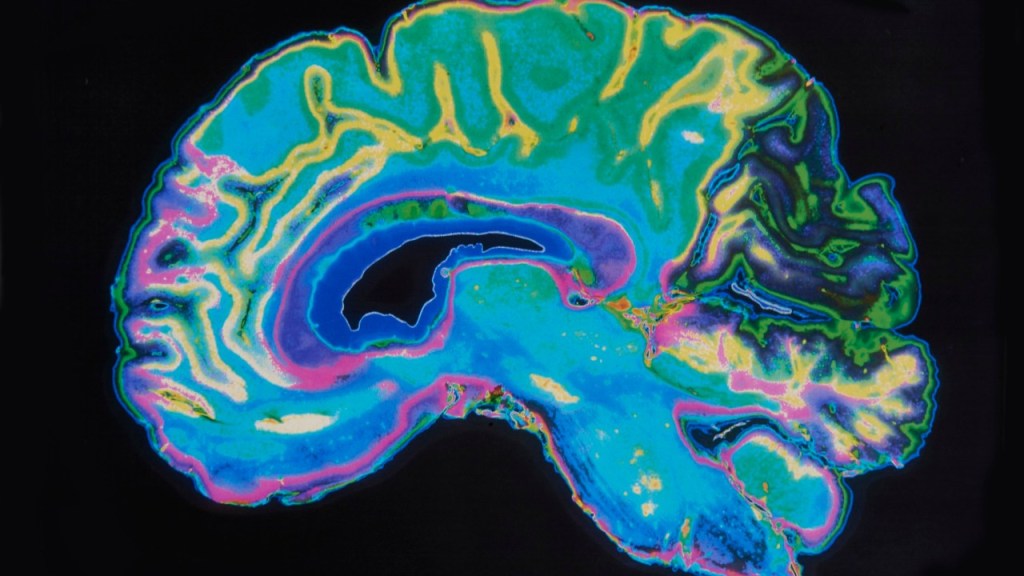This time of year is the anniversary of death for several young people in our circle of loved ones. This year is a time in history that will be known for many deaths throughout the… More
A Compassionate Prescription

I’ve been reading about ADHD and finding the latest research fascinating. Especially what doctors and scientists have been able to learn from brain scans. Physiological differences can be seen in ADHD brains and neurotypical brains. Those differences affect the way people perceive themselves and the world around them. My interest in ADHD isn’t random. It’s personal. Recently someone recognized signs of it in me, so I’m doing some investigating. What I’ve found so far has helped make sense of things in my life. My brain works differently than most people’s brains (4.4% of adults in the US have been diagnosed). It always has, but I’ve worked hard, really hard, to make it work neurotypically (non-ADHD). Sometimes I have so much going on mentally and emotionally that it’s hard to think clearly, remember important information, or focus on what people around me need. Unfortunately, no one can see that, like they can see me sitting in a wheelchair or carrying my arm in a sling. So, assumptions are made on appearances without knowledge. Judgments are communicated, verbally and non-verbally. I become easy prey for the lie of “not good enough,” which leads to feeling embarrassed, a form of shame.
We know there were people who didn’t know who Jesus really was or understand His mission. They made assumptions and judgments based either on their ignorance or their arrogance. Was He tempted to feel shame because of the things said to Him and about Him? According to Hebrews 2:17 I believe He was, and that encourages me. Each time He was questioned, accused, or condemned He responded with confidence in who He was – the beloved Son of God. I don’t have to believe what some people think about me. The truth is that I am holy and blameless before Him (Ephesians 1:4) because my life is hidden in Christ (Colossians 3:3), and I am greatly loved (Ephesians 2:4).
Receiving love and acceptance from Him frees me to love others, so I’ve also been drawn to looking at how Jesus treated people who felt shame. A leper ostracized from society (Matthew 8), a woman with a blood disease (Mark 5), a hated tax collector (Luke 19), and an immoral woman at a well in Samaria (John 4) come to mind. He saw beneath their circumstances and behaviors. He addressed them with compassion. I want to remember that when I’m confronted with people in awkward circumstances or exhibiting uncomfortable behaviors. They’re probably already feeling shame and need my compassion.
Resource link
https://www.additudemag.com/slideshows/brain-imaging-spect-scans-amen/?src=embed_link
Driving in Traffic

Don’t let anyone else drive your truck. For a truck driver that means don’t be pressured by four-wheelers. That’s trucking lingo for any vehicle with four wheels, no matter what size it is. What does that pressure look like? Drivers who cut in front of them, try to cut in front of them, throw up their hands (or make obscene gestures) when passing, or just blow their horn at them. Truck drivers already know they take up a lot of room on the road, take longer to get up to speed or slow down, and make everyone wait while they maneuver a turn. Many of them don’t like that kind of attention, but they’re doing the best they can to get us the stuff we want in the time we’ve become accustomed to having it. Oh, I know there are jerks out there. We called them “super truckers.” Not because we thought they were super drivers, but because they thought they were. Speeding, tailgating, and recklessly switching lanes are some of our qualifications for being considered a super trucker. I’m not referring to any of them in this post.
Did Jesus know what pressure felt like? I imagine the expectations of the multitudes felt like pressure, and the Pharisees were always questioning and accusing Him. Perhaps pressure also came from family and friends. The request from His mother at the wedding in Cana in John 2:3, the taunting of His brothers in John 7:6, the pleading of Mary and Martha in John 11:3, and even His disciples were impatient about the kingdom in Luke 19:11 and Acts 1:6. How did He respond? It seems that He had a confidence that refused to allow Him to be dissuaded from what He was doing. I believe that confidence came from spending time with His Father, learning what the Father wanted Him to do. Nothing was more important to Him, so no one could pressure Him into doing anything else.
Jesus told Philip in John 14:9 that if he had seen Him, then he had seen the Father. Jesus has given us access to the Father! I, too, can have confidence in knowing I’m doing what He wants me to do when I spend time with Him, listening to Him. Ah, but it will cost me time, something demanded by the multitude of things to do, places to go, and people to see. Yes, I’m pressured by “have to,” “should,” and “expected.” This is a hurried culture we live in with calls of urgency coming from many directions, but we don’t have to be conformed to it (Romans 12:2) by giving in to the pressure of traditional standards or people’s expectations. We can drive our own trucks; the life God has given us. I hope you spend time with the Father today and every day, so that no one else can drive your truck.
A Garden Invitation

It’s been a hard week, trying to keep pace with responsibilities and expectations while voices of criticism and condemnation whisper in the background. It has wearied me beyond my capacity of will power. Trying to believe the familiar verses I quote to myself only adds to the load of failure I’m carrying. I don’t always know where the help will come from, but I always know that my friend, Jesus, will provide what I need. Yesterday it came from a mentor I visit with once a month, a precious long-time friend. As we were parting, she shared Psalm 27:8 with me from the New Living Translation. “My heart has heard you say, Come and talk with me. And my heart responds, Lord, I am coming.” This morning I spent time studying and meditating on that verse and found it to be the help I needed. Here are some excerpts of what Alexander MacLaren had to say about the passage in his Expositions of Holy Scripture:
Our restlessness, our yearnings, our movings about as aliens in the midst of things seen and visible, all these bid us turn to Him in whom alone our capacities can be satisfied, and the hunger of our souls appeased. . . . In the face of Jesus Christ, ‘the light of the knowledge of the glory of God’ beams out upon us, as it never shone on this Psalmist of old. The voice that he heard calling him was less penetrating and less laden with love than the voice that calls us. They sound to us from the cradle and the cross, and they are wafted down to us from the throne. God’s merciful invitation to us poor men never has taken, nor will, nor can, take a sweeter and more attractive form than in Christ’s version of it: ‘Come unto Me, all ye that labour and are heavy laden, and I will give you rest.’
I envision Him sitting on a bench where warmth and light emanate from Him over a beautiful garden. I stand in the shadows surrounded by the chill of darkness. He looks at me and pats the place next to Him, an invitation to come sit with Him. I walk quickly to be close to Him. The light of His love begins to warm that chilly place in my heart. He asks about the burden I’m holding, and the light of His truth begins to reveal the deception that I wasn’t even aware had crept in. I tell Him about it, and He offers to take it. My hesitation comes from I’m believing I’m responsible for and capable of taking care of it, which is a lie. The truth is that everything I feel responsible for and worry about is in the capable hands of His control. What I choose to believe will determine what I do with the burden. If I continue to believe the lie, I cannot have the rest He offers. If I change my thinking and believe the truth that He has spoken, He replaces the burden with rest.
Again, I refer to Alexander MacLaren, “there is only one tract of human experience in which the promise is always and absolutely fulfilled: Ask, and ye shall receive; seek, and ye shall find.” What am I seeking? What are you seeking? The lies of self-sufficiency, misplaced responsibility, and assumed expectation will always be calling to us. May our hearts, minds, souls, and strength be turned toward Jesus, “the radiance of the glory of God and the exact imprint of his nature.” (Hebrews 1:3) No other person or thing can deliver on the promise of rest we seek, no matter how much we believe it can. And that’s the truth!
Wilderness Abundance

As Americans, we don’t realize how rich we are. People living in many places of the world don’t have access to resources we take for granted. This is most prominent in my life right now in the area of food. And I don’t think it’s just me. A quick search on the internet for diets will yield dozens of options. Individuals and companies are making a lot of money from them. So, I know I’m not the only one struggling to reduce my calorie intake. Not having enough money to buy the abundance of food I store in my kitchen would seem to be the easiest and most cost-effective way to keep those extra pounds off this body. Why don’t I just stop buying food that I don’t need or isn’t healthy? That question led me to realize that living in excess is as challenging as living in poverty.
In my quest to know what Jesus would do in the circumstances of my life, He reminded me of the temptation He experienced in Matthew 4. At first glance, it doesn’t seem that He was experiencing excess. The wilderness was a barren place with no food. But He was the One who had created everything and could just speak a word to have any and all the food He wanted. That’s excess! Everywhere He went, at all times, He had access to more than whatever He needed. How was He able to restrain Himself? “He was God” is an unsatisfying Sunday School answer. I’m better helped by remembering what Paul wrote in II Corinthians 8:9, “For you know the grace of our Lord Jesus Christ, that though he was rich, yet for your sake he became poor, so that you by his poverty might become rich.”
Truly, “because he himself has suffered when tempted, he is able to help those who are being tempted. We do not have a high priest who is unable to sympathize with our weaknesses, but one who in every respect has been tempted as we are, yet without sin. Let us then with confidence draw near to the throne of grace, that we may receive mercy and find grace to help in time of need.” Hebrews 2:18; 4:15-16
He doesn’t offer a standard for me attain, but grace to attain the standard that He lived in His humanity. Once again I’m faced with the tension of Divinity and humanity in this body, and am encouraged by the grace of His presence. May you find this encouragement in the circumstances of your life today. I’d like to know your thoughts. If you’re not comfortable commenting here, you can contact me at doucettenest@gmail.com
A Nostalgic Trip

One of my favorite movies (and I have quite a few) is Harvey. It’s the story of a man (Elwood P. Dowd played by Jimmy Stewart) whose best friend is a pooka named Harvey, an invisible 6 ft. 3.5 in. white rabbit. Throughout the movie Elwood talks and refers to Harvey assuming everyone knows he’s real. I love the world Elwood lives in. He doesn’t seem to acknowledge the skepticism or outright unbelief of people. And he’s true to what he believes. Although Harvey is unseen by others, Elwood always introduces him to friends and consults him when making a decision. Sometimes he simply converses with Harvey, knowing that he understands like no one else does.
This movie is on my mind because I just returned from a trip to Massachusetts, where I lived for most of my life. I drove around areas that have so many memories, visually looking at places that hold emotions within me. How do I separate the past from the present? There is this intangible, unseen part of me that continues to exist when its time has passed, like a ghost walking next me. Not a scary ghost, but someone who can only understand the emotions because of shared experience. Then I realize it’s not a ghost. It’s Jesus! He was with me through all the experiences these places bring to my mind, the good and the bad. I can talk with Him about them like I can talk with no other person. He understands like no other person can. He laughs and cries with me as we reflect on those memories together.
In the past I’ve believed that I needed to make sure I’d confessed any sin I may have committed or acknowledged my unworthiness before enjoying His presence. That ritual was burdensome and sometimes kept me from going to Him at all. It certainly didn’t make for the kind of relationship I thought I should have with Him. Now I know that I don’t need a ritual of repentance to assure my acceptability of His attention. I need only to turn to Him, because He’s always there and I’m always acceptable to Him (Ephesians 1:4).
Jesus is always with us and more real than Harvey is to Elwood P. Dowd. We are children of God, the treasure He gladly sacrificed His Son to redeem. The freedom He purchased for us should never be overshadowed by some sense of shame of unworthiness. May you know this reality today. And I would love to hear from you, wherever you are on this transient road of mortal life that we’re traveling together toward our eternal Home.
Slow Realization
A year ago, my life was so different. I had been lonely for a long time. Not just weeks or even months. It had been a couple of years. Now that Roland was a truck driver, he was gone for days, sometimes a week at a time. We had made the difficult decision to leave the church we had been attending for 10 years, and I wasn’t ready to be getting involved in the new church we had joined. I had no friends to visit with. No one called to see how I was doing. Two of our sons live within 10 minutes of us and attend different churches with their families. I’m thankful that they are involved in the ministries there, are responsible employees for the companies they work for, and are following Roland’s example as husbands and fathers. But it doesn’t leave much time for visiting with extended family.
I wanted some companionship. So, I found Gracie online at a rescue agency in Augusta GA, two and half hours away. She was perfect – a 9 lb. Yorkie mix who just wanted companionship. At first, I took her everywhere with me. She made it easier for me to get myself out of the house. Then stores started putting up signs saying no pets allowed, only service dogs. I had to leave her at home when I did any shopping. That was hard, but there was nothing I could do about it.
Then my life began to change. The grandkids started coming over more often. I made some friends at church that came to visit. Gracie showed signs of distress when there was commotion, whether it was people or noise. Leaving her home for more than a couple of hours at a time started causing troublesome behavior. That’s when the first thoughts of returning her to the rescue agency began. By the time I accepted it, I knew it would be best for her, no matter how hard it was for me. I did some crying, but still knew it was the right thing to do. A friend encouraged me with the thought that God had created Gracie, given her to me, and would take care of her.
The day I returned her was bittersweet. Gracie loved riding in the car, and I enjoyed her company. But I knew saying good-bye to her would be so hard. I wished I could have found someone closer to take her, but I had signed a contract that if I couldn’t keep her, I’d bring her back to them. I met the woman at Petsmart like I had the year before. She had another woman with her who asked me why I was returning a rescue that I had only gotten a year ago. After I told her, she introduced herself as the director of the agency and proceeded to verbally humiliate me as we stood outside the store. I walked away while she was still talking and the woman I came to meet followed me to my car. In tears I carried Gracie’s things from my car to hers. When I finally handed her over, I went back to my car and wept and prayed for about 15 minutes before I could think about driving the two and half hours back home.
A week later I felt I could check the online site of the agency to see if Gracie had been adopted yet without crying. What a shock to find they had accused me of just not wanting to take care of Gracie anymore. People commented saying horrible things about the heartless owner that returned her dog just because she didn’t want to take care of it anymore. Some of the comments were so vicious I was relieved that they didn’t know who I was, but I still felt the sting of the false accusations and condemnation. I wanted to defend myself, make them see the truth. Oh, it’s hard enough to have my wrongs exposed, but when my good deeds have been intentionally misconstrued, I want vindication!
In my pain and anger, Jesus reminded me that He knows how it feels to be wrongly accused, humiliated, and condemned. He stood before religious leaders accused of blasphemy, the highest Jewish crime. He stood before the civil government accused of treason, the highest Roman crime. Neither were true. His good deeds had been misconstrued.
Oh, the comfort of knowing someone empathizes! He not only took our sins to pay the penalty for them, He also was made like us in every respect, so that He might become a merciful and faithful high priest (Heb. 2:17). Because He was tempted in every respect as we are, we have confidence to come to the throne of grace knowing that we will find mercy and grace to help in our time of need (Heb. 4:15-16).
And so, I learn from Him how to stand silent amid false accusations. As His accusers spat out lies with self-righteous indignation, He remained silent. He knew who He was, He knew the truth, and He knew who His judge was.
I am a redeemed daughter of God. As my Judge He requires that I do justice (do what is morally right), love kindness (be kind), and walk humbly (be genuine). If I’ve done those things, I stand blameless, no matter what is said or thought about me. My need for vindication can been replaced with confidence in my innocence, so I can remain silent.
For so many years I heard and talked about how we should be like Jesus, but no one ever showed me how. Anyone who exhibited any likeness to Jesus was hailed as having reached a level of spiritual maturity not attainable to many people. My best efforts would have to be enough. Really? That’s not what Jesus says! I’d like to invite you to believe that not only can you be like Him, He desires that for you.
“We have more freedom than we think. We have more power than we believe. We have more authority than we realize.” ~ Alan Fadling
An Unassuming Introduction
John stood in the Jordan River where people had gathered. Some of them began to form a line leading away from the bank. One by one they took their turn stepping into the water toward John. He spoke to them and they responded. He then dipped them under the water and pulled them back up. A man appeared from the horizon walking toward the group and joined the line.
This unassuming man that stood among ordinary people as one of them was the expression of God Himself in human form. He didn’t just come to us; He came near to us. He lived with us, doing the everyday monotonous tasks with us. He got dirty and hungry and tired. His plans got changed, He was interrupted, He was misunderstood. He knew disappointment, frustration, grief, loneliness and betrayal. And all the while, He saw how we try to hide our fear and shame, and how they rule our lives.
The Good New is that Jesus offers to bring His Divine nature into our messy, crazy humanity. I can’t articulate how it all works. I just know it does. When Nicodemus was trying to understand how God’s Spirit works in the heart of a person, Jesus used the wind as an example. We can’t see it, but we see the effects of it. I’m reminded of Christina Rossetti’s poem:
Who has seen the wind?
Neither you nor I,
But when the trees bow down their heads,
The wind is passing by.
I’m often helped to understand difficult things by using familiar experiences, stories I’ve heard, information I’ve learned, and sometimes even movies I’ve seen. A scene from The Wizard of Oz helps me understand the paradox that God is great in might, powerful in authority, awesome in majesty; and He is gentle in compassion and kind in His dealings with His children. He is always both.
One of the classic scenes is when Dorothy comes to the great and powerful wizard of Oz, knowing that he is her only hope, but she’s not sure he will help. She has done everything she was told to gain his favor. She approaches with trepidation. Then Toto pulls back the curtain to reveal the kind, approachable professor who is the great and powerful wizard of Oz. I don’t mean to be sacrilegious or blasphemous, but I think of Jesus as the kind, approachable man behind the curtain of the great and powerful God that we should fear.
My life gets hard and messy and broken and scary. My need is beyond what anyone can do to help. So, I close my eyes and see an unassuming man standing next to me. He smiles and speaks familiar words of love and comfort. “I’m with you and I want to help you. Nothing is too hard for Me to do, too messy for Me to clean, too broken for Me to fix, or too scary for Me to keep you safe.” I believe Him and my soul finds peace. Belief and trust are hard to articulate, but we know it when we see it in others, and when we do it ourselves. May you experience it for yourself.


